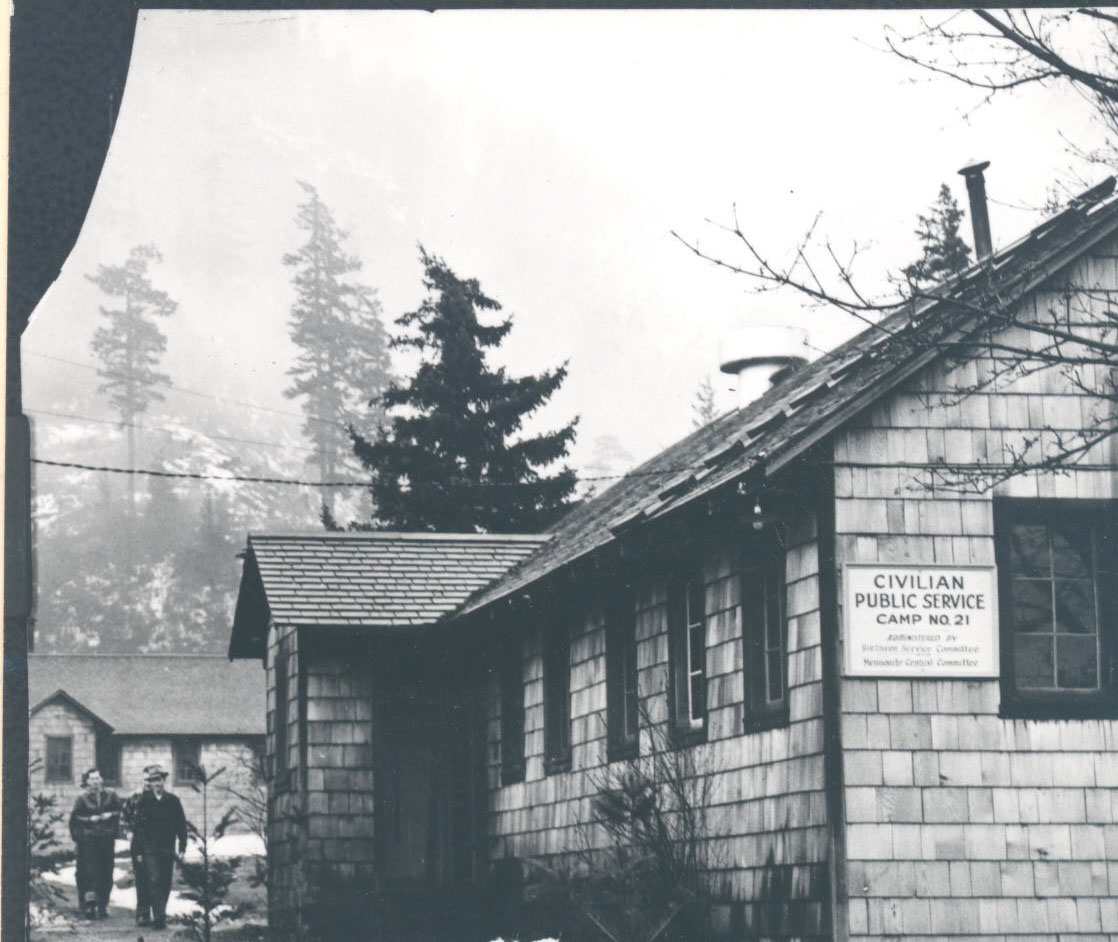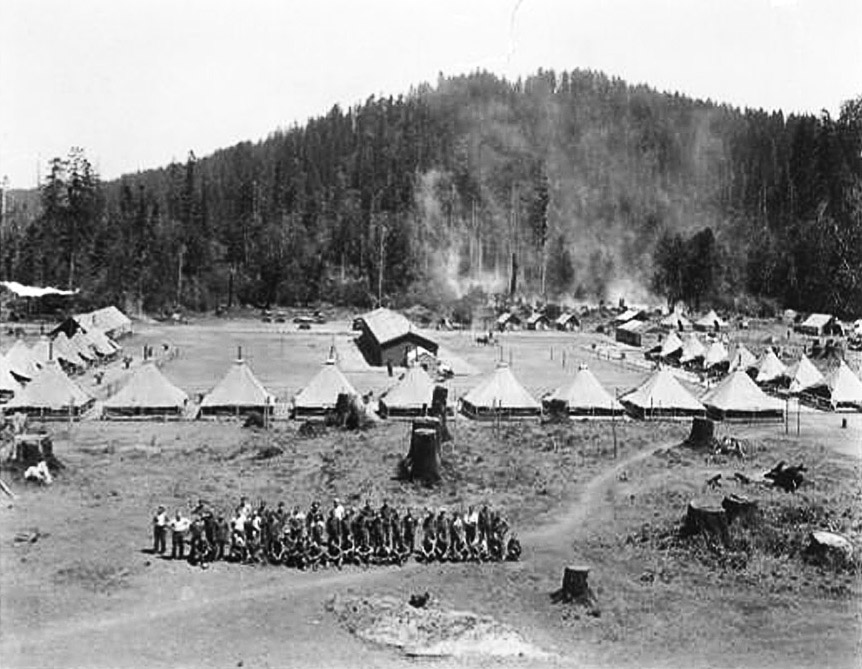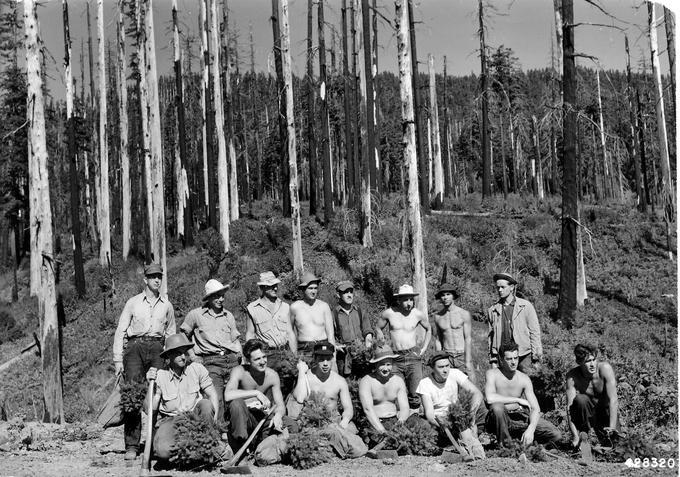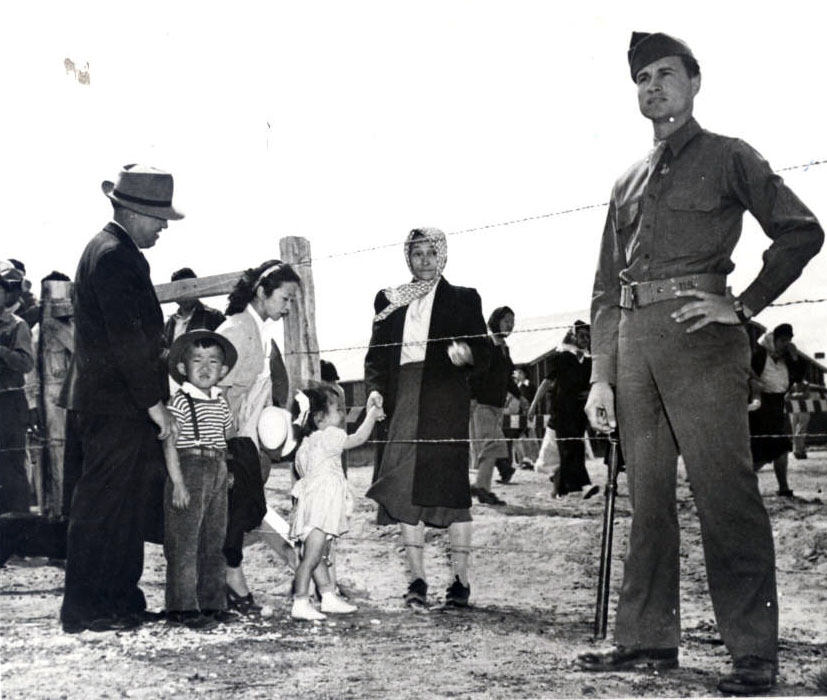Civilian Public Service Camp #21 opened in November 1941 at Wyeth, a few miles east of Cascade Locks in the Columbia River Gorge. It was the best known of the 150 camps in the Civilian Public Service system, which the Selective Service established to provide “alternative service under civilian direction” for conscientious objectors during World War II. Those men who were opposed to participation in the military due to deep religious or philosophical beliefs were classified as conscientious objectors by their local Selective Service boards. Some chose to serve in noncombatant roles in the military, and those who objected to any military service were assigned to CPS camps. Most of the camps were operated for the Selective Service by so-called peace churches, including the Religious Society of Friends, the Mennonites, and the Church of the Brethren. CPS #21 was a Brethren camp.
The work projects at CPS #21, which were supervised by the U.S. Forest Service, included constructing roads and trails, maintaining campgrounds, working on telephone lines, felling snags, fighting fires, and building lookout towers. Some men were assigned the work of keeping the camp operating—that is, cooking meals, doing laundry, and handling administrative tasks required by the Selective Service and the Forest Service. During the summer, some of the men were sent to side camps to work on special projects and to locate them closer to potential forest fires. The largest side camp, on Larch Mountain, operated throughout the war; and smaller, temporary side camps were opened during the summers at Lost Lake, Mud Lake, and other locations.
The Wyeth camp gained national attention in March 1942 with the arrival of film actor Lew Ayers, who had gained conscientious objector status at considerable risk to his career. Although he was at the camp for only about six weeks before joining the army as a noncombatant, Ayers’s presence served to publicize the CPS system.
The men of CPS #21 and the camp director, Rev. Mark Schrock, gained additional notoriety in the summer of 1942 because of their public opposition to the removal and incarceration of people of Japanese descent. The War Relocation Authority demanded the release of one conscientious objector, George Kiyoshi Yamada, so that he could be sent to a detention camp. Schrock refused to authorize the release, characterizing the removal as a “crime and insane inhumanity to man.” The men in the camp supported his position in a letter to Selective Service signed by camp president Charles Davis. This strong stand resulted in a compromise that allowed Yamada to remain in the CPS system, although at an inland camp. A few months later, the men at CPS #21 gained even more attention by refusing to work on what they regarded as a war-related project, building logging roads into the largest stand of virgin timber in the United States near Estacada, Oregon.
CPS #21 became known as the Athens of CPS because of its arts and education programs. The Illiterati, a literary magazine of poetry and other creative work by conscientious objectors, was published in the spring of 1943. The U.S. Post Office destroyed most copies of the first issue when the drawing of a nude woman by Kemper Nomland (1919-2009) was judged to be obscene. Six issues of Illiterati were published, some of them at Camp #56 at Waldport. In addition, Kermit Sheets (1915-2006) wrote two plays that were produced at CPS #21—a parody of Chekov entitled Stalingrad Stalemate and a Gilbert and Sullivan parody, The Mikado in CPS. Both men became important members of the Fine Arts Camp established in 1944 at CPS #56 in Waldport, Oregon.
In October 1943, CPS #21 was the site of the School of Pacifist Living, an educational effort established by the Brethren Service Committee for men from all Brethren camps. The School was directed by Dan West from the Church of the Brethren national staff. About twenty-five men participated in the ambitious research effort to explore all aspects of a pacifist life. Several thoughtful reports were written, although the goal of producing a book on pacifist living was not achieved. Considering that the research and writing were done in the evenings after a full day of physical work, the results were impressive.
Mark Schrock resigned as director of CPS #21 in February 1944, and the camp leadership was assumed by two COs, Robert Case and Charles Davis. Davis would return to Oregon after the war, where he made significant contributions as comptroller of Electro Scientific Industries, chair of the Oregon affiliate of the American Civil Liberties Union, and Public Utilities commissioner. After the war ended in August 1945, CPS men were discharged in large numbers, and the camp was closed in July 1946. The Wyeth Campground, on the site of CPS #21, is administered by the U.S. Forest Service.
-
![]()
Civilian Public Service Camp #21, 1942.
Courtesy Oreg. Hist. Soc. Research Library, 015051
-
![]()
Civilian Public Service Camp #21, 1942.
Courtesy Oreg. Hist. Soc. Research Library, 022549
-
![]()
CO crew stacks wood near Herman Creek, 1942.
Courtesy Oreg. Hist. Soc. Research Library, 015050
-
![Conscientious objectors build a retaining wall]()
Civilian Public Service Camp #21, 1942.
Conscientious objectors build a retaining wall Courtesy Oreg. Hist. Soc. Research Library, 018003
-
![Staff of Camp Wyeth]()
Mark Shrock, D.D. Funderburg, Albert Boher, 1942.
Staff of Camp Wyeth Courtesy Oreg. Hist. Soc. Research Library, 015048
-
![]()
Elected council at Camp Wyeth, 1942.
Courtesy Oreg. Hist. Soc. Research Library, 015049
-
![Ayres (front, second from the left) leaves Wyeth and joins the line at the induction center]()
Lew Ayres, 1942.
Ayres (front, second from the left) leaves Wyeth and joins the line at the induction center Courtesy Oreg. Hist. Soc. Research Library, 000300
-
![]()
Gladden Boaz, Wyeth, 1942.
Courtesy Oreg. Hist. Soc. Research Library, 014614
Related Entries
-
![Charles Davis (1919-2002)]()
Charles Davis (1919-2002)
Charles Davis was a distinguished Oregon businessman, public servant, a…
-
![Civilian Conservation Corps in Coos County]()
Civilian Conservation Corps in Coos County
From 1933 to 1942, Civilian Conservation Corps (CCC) enrollees in Coos …
-
![Civilian Public Service Camp #56]()
Civilian Public Service Camp #56
Civilian Public Service Camp #56, on the central Oregon Coast four mile…
-
![Hart Mountain Civilian Conservation Corps (CCC) Camp]()
Hart Mountain Civilian Conservation Corps (CCC) Camp
Camp Hart Mountain, a Civilian Conservation Corps camp, operated from O…
-
![Japanese American Wartime Incarceration in Oregon]()
Japanese American Wartime Incarceration in Oregon
Masuo Yasui, together with many members of Hood River’s Japanese commun…
Related Historical Records
Map This on the Oregon History WayFinder
The Oregon History Wayfinder is an interactive map that identifies significant places, people, and events in Oregon history.
Further Reading
Kovac, Jeffrey. Refusing War, Affirming Peace: A History of Civilian Public Service Camp No. 21 at Cascade Locks. Corvallis: Oregon State University Press, 2009
McQuiddy, Steve. Here on the Edge. Corvallis: Oregon State University Press, 2013













